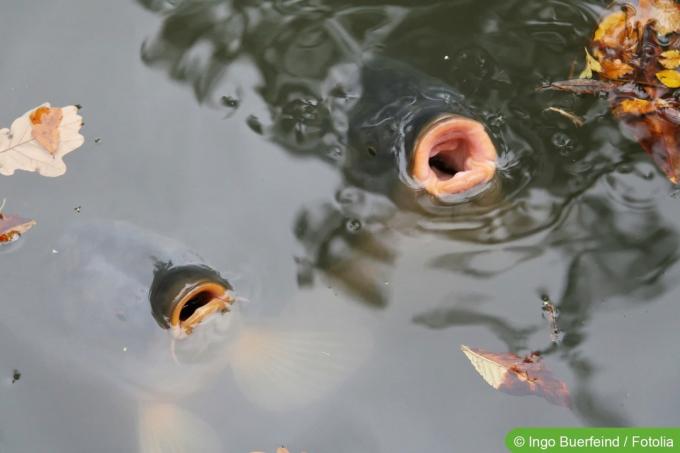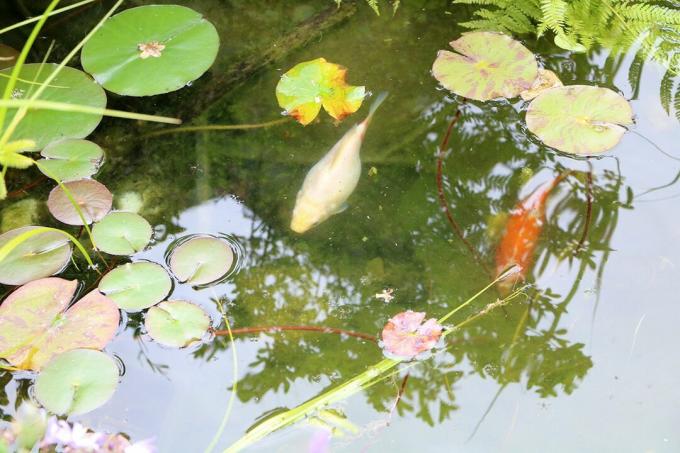

Table of contents
- Gasping for air in the garden pond
- Changes in fish due to external influences
- Preventive measures for a healthy fish tank
- Eliminating disease
- Worth knowing about the breathing air for fish
Many garden pond owners will be familiar with the following problem: some fish suddenly swim to the surface of the water and gasp for air. When this fish behavior first occurs, many owners are unaware of what the problem is in the tank and what the consequences are for the fish. Since there can be a number of reasons for surface swimming, here are the top reasons and methods of improvement.
Gasping for air in the garden pond
One of the most common reasons for gasping for air in the garden pond can be insufficient oxygen in the water. In the first step, every owner should either add oxygen or check the oxygen pump for damage. The addition of oxygen usually helps to give the fish a carefree stay in the pond again. But there are other reasons to consider. In addition to the lack of oxygen, the pH value is of great importance. There should be a constant pH in the pond to keep the fish healthy and happy. If this pH value changes, this can have consequences for the fish. Every owner should check the pH value in their pond regularly, otherwise high nitrite values could poison the fish. You can tell whether the fish are already suffering from such poisoning by the typical gasping for air on the surface. In addition, the animals move much more slowly, only drift in the water and the heart beats slower. Often there is no longer any help for the affected fish.
If the nitrite value is too high and the water is contaminated as a result, you should change the water immediately. Even a 40% water change can help to neutralize the pH value in the pool. The nitrite value must not be higher than 0.5 mg per liter. If the value is above that, the water must be changed again. A pH below 7 is a good value because this is ammonium. If the value is above 7, the ammonium changes to ammonia and this is harmful to the fish. The fish will absorb the ammonia and ammonia poisoning could result. An ideal and constant pH value should be around 6.9.
Changes in fish due to external influences
In order to give the fish a healthy and happy life, clean water is the most important element:
- Every pond owner should check their water daily and deal with impurities.
- Once a fish has been poisoned or a nitrite level that is too high spreads, the water in the pond can "tipp over" very quickly.
- Other influences such as dirt, leaves and branches should be permanently and regularly removed from the tank.
- If the owner is careless, this can damage the fish in the long term.
- If it is very warm, this can also affect the quality of the water.
At very warm temperatures, oxygen levels drop, which again is one of the main reasons for gasping, as discussed above. Because the pond is in the garden, you often don't have as precise temperature control as in an aquarium tank.
Preventive measures for a healthy fish tank
There are some tools that permanently protect the garden pond from contamination and keep the water clean. In order to give the fish enough oxygen at all times, it makes sense to install an oxygen activator. It can be switched on at the touch of a button and adds oxygen to the pond. In order to prevent the "tipping" of the water, one should also reconsider the feeding behavior. Too much food at once can contaminate the water as the fish cannot consume so much food at once. It makes more sense to feed the fish more frequently, but only when the food has been used up. You should also check the water quality after a heavy rainy season, as the rain can also change the composition of the water.
In autumn and early winter in particular, it is important to regularly remove leaves and other dirt from the pond. Leaves lying on the surface can be easily removed with a net. There are also special plants that help maintain an even water environment. Contamination and bacteria can be permanently prevented or eliminated. reduce if you let the pond filter run all day. The filter thus cleans the water throughout the day. If the filter is only switched on for a few hours, it cannot manage to rid the entire pond of bacteria.
Eliminating disease
If you notice that something is wrong in the pond, you should also watch the fish consciously. If the situation is still not under control after checking the water and adding oxygen, illness can be another reason. You should consciously take your time and observe the animals closely. In the case of fish diseases, there are also some aids that can bring improvement to the fish. If only one or two animals are affected, they should be quickly moved to a separate tank (or a clean water butt in an emergency) and treated.

If the above steps are observed and the animals and the pond are carefully observed, you can have permanently healthy animals and a clean tank. The larger the pond, the more constant the water quality and health in the pond can remain. In a small pond you should only use very few fish, because with less water the water can "tip" more quickly. Regular checking of the water, the various values and the fish are very important to prevent diseases or fish kills.
Worth knowing about the breathing air for fish
If fish are mainly at the top of the water and gasping for air, then this is usually due to the components that are in your water tank:
- It is possible, for example, that you have integrated copper lines in your garden pond or in your system. Under certain circumstances, some copper can detach here and get into the water.
- A possible cause could also be that the PH value of the water is too high. Measurements should be carried out regularly here, otherwise the fish can be poisoned, for example, by the excessive amounts of nitrite.
- If this type of poisoning occurs, the fish not only gasp for air on the water surface, but also become increasingly slow, hardly move or even die after a while.
What can you do? – In any case, do not panic if these described symptoms and behaviors apply. Instead, replace about half of the water in the pool. In general, you should measure the nitrite value every day, it must not be higher than approx. 0.5 mg per liter. Otherwise part of the water has to be changed again.
The following can be said about the pH value: If it is below the important mark of 7, then the substance at issue is ammonium, which is present in the water and is harmless to the fish. If, on the other hand, it is higher, it is ammonia that has formed and that the fish are absorbing. Urgent action should be taken here to avoid ammonia poisoning of the fish.
The solution:
Simply lower the pH to 6.9.
 garden editorial
garden editorial I write about everything that interests me in my garden.
Find out more about animals in the garden pond

22 small pond fish | Fish for small pond
Only a small pond fits in small gardens. But Mother Nature has also created a few little fish for these mini ponds. To be more precise, even several interesting species, which are not inferior in beauty to the large specimens. But be amazed!

7 Fish Diseases | Help for pond fish
For many an animal lover, their fish mean everything. The concern is correspondingly great when the animals suddenly behave in a strange way or show external symptoms of one of the numerous pond fish diseases. This guide explains how the owner makes an exact diagnosis, what causes it and what to do in this case.

Overwintering pond mussels | 14 tips for pond mussels in winter
Pond mussels are practical animals for the garden pond, as they can filter and thus clean the water. Their main food source is algae. But what happens to the pond mussel in winter when the water surface freezes over? Here we reveal how overwintering is possible.

Orfe in the garden pond | 10 tips for keeping & propagation
The water has been filled in, the green planting is in place. Now a color contrast and movement in the garden pond are still missing. A swarm of gold orfs can provide both. Yellow-orange in colour, they are clearly circling in the water. When do you feel comfortable in it?

Frog in the pond: what do frogs eat in the garden pond?
Frogs in the pond are important beneficial insects because they devour numerous annoying pests. Frogs are good and patient hunters, able to ambush prey for a long time. The more diverse the pond is designed, the greater the food supply, which attracts different species.

Sturgeon in the garden pond | 10 tips for keeping in the pond
Would you like to enrich your pond with a real sturgeon? The desire for such a striking animal is easy to understand. Our tips on how to handle this living fossil will help you ensure that keeping is always successful.



